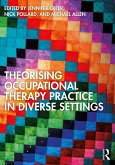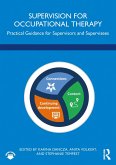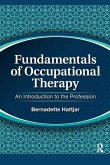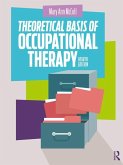Occupational Therapy in Australia
Professional and Practice Issues
Herausgeber: Brown, Ted; Isbel, Stephen; Bourke-Taylor, Helen M.
Occupational Therapy in Australia
Professional and Practice Issues
Herausgeber: Brown, Ted; Isbel, Stephen; Bourke-Taylor, Helen M.
- Broschiertes Buch
- Merkliste
- Auf die Merkliste
- Bewerten Bewerten
- Teilen
- Produkt teilen
- Produkterinnerung
- Produkterinnerung
This ground-breaking text provides a comprehensive guide to the occupational therapy profession in Australia, from the professionâ s role in the healthcare system to the broad scope and nature of its practice.
Andere Kunden interessierten sich auch für
![Theorising Occupational Therapy Practice in Diverse Settings Theorising Occupational Therapy Practice in Diverse Settings]() Theorising Occupational Therapy Practice in Diverse Settings30,99 €
Theorising Occupational Therapy Practice in Diverse Settings30,99 €![Supervision for Occupational Therapy Supervision for Occupational Therapy]() Supervision for Occupational Therapy50,99 €
Supervision for Occupational Therapy50,99 €![Occupational Performance Coaching Occupational Performance Coaching]() Fiona GrahamOccupational Performance Coaching35,99 €
Fiona GrahamOccupational Performance Coaching35,99 €![Fundamentals of Occupational Therapy Fundamentals of Occupational Therapy]() Bernadette HattjarFundamentals of Occupational Therapy84,99 €
Bernadette HattjarFundamentals of Occupational Therapy84,99 €![Occupational and Activity Analysis Occupational and Activity Analysis]() Heather ThomasOccupational and Activity Analysis120,99 €
Heather ThomasOccupational and Activity Analysis120,99 €![Theoretical Basis of Occupational Therapy Theoretical Basis of Occupational Therapy]() Mary Ann McCollTheoretical Basis of Occupational Therapy81,99 €
Mary Ann McCollTheoretical Basis of Occupational Therapy81,99 €![Theory in School-Based Occupational Therapy Practice Theory in School-Based Occupational Therapy Practice]() Patricia LaverdureTheory in School-Based Occupational Therapy Practice79,99 €
Patricia LaverdureTheory in School-Based Occupational Therapy Practice79,99 €-
-
-
This ground-breaking text provides a comprehensive guide to the occupational therapy profession in Australia, from the professionâ s role in the healthcare system to the broad scope and nature of its practice.
Hinweis: Dieser Artikel kann nur an eine deutsche Lieferadresse ausgeliefert werden.
Hinweis: Dieser Artikel kann nur an eine deutsche Lieferadresse ausgeliefert werden.
Produktdetails
- Produktdetails
- Verlag: Allen & Unwin
- 2 ed
- Seitenzahl: 450
- Erscheinungstermin: 19. April 2021
- Englisch
- Abmessung: 246mm x 174mm x 24mm
- Gewicht: 794g
- ISBN-13: 9781760877446
- ISBN-10: 1760877441
- Artikelnr.: 60605115
- Herstellerkennzeichnung
- Books on Demand GmbH
- In de Tarpen 42
- 22848 Norderstedt
- info@bod.de
- 040 53433511
- Verlag: Allen & Unwin
- 2 ed
- Seitenzahl: 450
- Erscheinungstermin: 19. April 2021
- Englisch
- Abmessung: 246mm x 174mm x 24mm
- Gewicht: 794g
- ISBN-13: 9781760877446
- ISBN-10: 1760877441
- Artikelnr.: 60605115
- Herstellerkennzeichnung
- Books on Demand GmbH
- In de Tarpen 42
- 22848 Norderstedt
- info@bod.de
- 040 53433511
Ted Brown is Professor and Undergraduate Course Convenor in the Department of Occupational Therapy at the School of Primary & Allied Health Care, Faculty of Medicine, Nursing and Health Sciences, Monash University-Peninsula Campus, Frankston, Victoria, Australia. Helen M. Bourke-Taylor is Associate Professor and Research Honours Course Coordinator in the Department of Occupational Therapy, School of Primary & Allied Health Care, Faculty of Medicine, Nursing and Health Sciences, Monash University-Peninsula Campus, Frankston, Victoria, Australia. Stephen Isbel is Associate Professor & Discipline Lead of Occupational Therapy in the Faculty of Health at the University of Canberra Hospital, Canberra, Australian Capital Territory, Australia. Reinie Cordier is Professor of Child Mental Health, Welfare and Wellbeing in the Department of Social Work, Education and Community Wellbeing, Faculty of Health and Life Sciences, at Northumbria University, Newcastle upon Tyne, United Kingdom. Louise Gustafsson is Professor of Occupational Therapy in the School of Allied Health Sciences and the Hopkins Centre, at Griffith University, Nathan Campus, Queensland, Australia.
Part I: The Australian context
1. An introduction to occupational therapy in an Australian context
2. Australia's health and health care system
3. History of Australian occupational therapy
4. The role of occupational therapy professional associations and
regulatory bodies in Australia
5. The scope of practice of occupational therapists in Australia: roles,
responsibilities, and relationships
6. Values and philosophy of occupational therapy
7. Ethical and legal responsibilities of occupational therapy practice
8. Occupational therapy in population health and health promotion
Part II: Professional issues
9. Skills for effective communication in occupational therapy practice
10. Working with clients: client-centred practice
11. Decolonising occupational therapy through a strengths-based approach
12. Occupational science in Australia
13. The education of occupational therapists in Australia: academic
education and practice education
14. Research in occupational therapy
15. Evidence-based practice in occupational therapy
16. Clinical reasoning in occupational therapy practice
17. Occupational therapy models of practice
Part III: Practice issues
18. Fundamentals of occupational therapy: understanding the environment
19. The occupational therapy practice process
20. Core business: task, activity and occupation analysis
21. Understanding human occupations: self-care, productivity, leisure,
play, education, sleep, and social participation
22. The development of occupations across the lifespan
23. Occupational therapy practice contexts
24. Emerging professional practice areas: focus on technology
25. Occupational therapy assessment
26. The role of occupational therapy in primary health care in Australia
27. Occupational therapy practice in regional, rural & remote Australia
28. Population and community occupational therapy practice and project
management in Australia
29. Advocacy, promotion, leadership and entrepreneurship in the
occupational therapy profession in Australia
30. Looking forward: occupational therapy in Australia's future
1. An introduction to occupational therapy in an Australian context
2. Australia's health and health care system
3. History of Australian occupational therapy
4. The role of occupational therapy professional associations and
regulatory bodies in Australia
5. The scope of practice of occupational therapists in Australia: roles,
responsibilities, and relationships
6. Values and philosophy of occupational therapy
7. Ethical and legal responsibilities of occupational therapy practice
8. Occupational therapy in population health and health promotion
Part II: Professional issues
9. Skills for effective communication in occupational therapy practice
10. Working with clients: client-centred practice
11. Decolonising occupational therapy through a strengths-based approach
12. Occupational science in Australia
13. The education of occupational therapists in Australia: academic
education and practice education
14. Research in occupational therapy
15. Evidence-based practice in occupational therapy
16. Clinical reasoning in occupational therapy practice
17. Occupational therapy models of practice
Part III: Practice issues
18. Fundamentals of occupational therapy: understanding the environment
19. The occupational therapy practice process
20. Core business: task, activity and occupation analysis
21. Understanding human occupations: self-care, productivity, leisure,
play, education, sleep, and social participation
22. The development of occupations across the lifespan
23. Occupational therapy practice contexts
24. Emerging professional practice areas: focus on technology
25. Occupational therapy assessment
26. The role of occupational therapy in primary health care in Australia
27. Occupational therapy practice in regional, rural & remote Australia
28. Population and community occupational therapy practice and project
management in Australia
29. Advocacy, promotion, leadership and entrepreneurship in the
occupational therapy profession in Australia
30. Looking forward: occupational therapy in Australia's future
Part I: The Australian context
1. An introduction to occupational therapy in an Australian context
2. Australia's health and health care system
3. History of Australian occupational therapy
4. The role of occupational therapy professional associations and
regulatory bodies in Australia
5. The scope of practice of occupational therapists in Australia: roles,
responsibilities, and relationships
6. Values and philosophy of occupational therapy
7. Ethical and legal responsibilities of occupational therapy practice
8. Occupational therapy in population health and health promotion
Part II: Professional issues
9. Skills for effective communication in occupational therapy practice
10. Working with clients: client-centred practice
11. Decolonising occupational therapy through a strengths-based approach
12. Occupational science in Australia
13. The education of occupational therapists in Australia: academic
education and practice education
14. Research in occupational therapy
15. Evidence-based practice in occupational therapy
16. Clinical reasoning in occupational therapy practice
17. Occupational therapy models of practice
Part III: Practice issues
18. Fundamentals of occupational therapy: understanding the environment
19. The occupational therapy practice process
20. Core business: task, activity and occupation analysis
21. Understanding human occupations: self-care, productivity, leisure,
play, education, sleep, and social participation
22. The development of occupations across the lifespan
23. Occupational therapy practice contexts
24. Emerging professional practice areas: focus on technology
25. Occupational therapy assessment
26. The role of occupational therapy in primary health care in Australia
27. Occupational therapy practice in regional, rural & remote Australia
28. Population and community occupational therapy practice and project
management in Australia
29. Advocacy, promotion, leadership and entrepreneurship in the
occupational therapy profession in Australia
30. Looking forward: occupational therapy in Australia's future
1. An introduction to occupational therapy in an Australian context
2. Australia's health and health care system
3. History of Australian occupational therapy
4. The role of occupational therapy professional associations and
regulatory bodies in Australia
5. The scope of practice of occupational therapists in Australia: roles,
responsibilities, and relationships
6. Values and philosophy of occupational therapy
7. Ethical and legal responsibilities of occupational therapy practice
8. Occupational therapy in population health and health promotion
Part II: Professional issues
9. Skills for effective communication in occupational therapy practice
10. Working with clients: client-centred practice
11. Decolonising occupational therapy through a strengths-based approach
12. Occupational science in Australia
13. The education of occupational therapists in Australia: academic
education and practice education
14. Research in occupational therapy
15. Evidence-based practice in occupational therapy
16. Clinical reasoning in occupational therapy practice
17. Occupational therapy models of practice
Part III: Practice issues
18. Fundamentals of occupational therapy: understanding the environment
19. The occupational therapy practice process
20. Core business: task, activity and occupation analysis
21. Understanding human occupations: self-care, productivity, leisure,
play, education, sleep, and social participation
22. The development of occupations across the lifespan
23. Occupational therapy practice contexts
24. Emerging professional practice areas: focus on technology
25. Occupational therapy assessment
26. The role of occupational therapy in primary health care in Australia
27. Occupational therapy practice in regional, rural & remote Australia
28. Population and community occupational therapy practice and project
management in Australia
29. Advocacy, promotion, leadership and entrepreneurship in the
occupational therapy profession in Australia
30. Looking forward: occupational therapy in Australia's future








